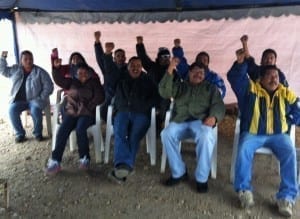Jan 9, 2013

Workers in Mexico launched a hunger strike for justice at PKC autoparts plants. Credit: Javier Zuniga/Los Mineros
Eleven workers from PKC wire harness plants in Mexico launched a hunger strike yesterday. They were among 122 workers fired by the Finnish autoparts company in mid-December for what they say is retaliation for seeking to form a union. They plan to continue the hunger strike until they are reinstated and their right to trade union freedom is recognized.
The fired workers include 18 members of the executive committee of Local 307 of the National Mineworkers Union (Los Mineros). The union believes the action was in retaliation for their pro-union vote at a rigged representation election in October.
According to Los Mineros, “workers were called individually to the human resources office and told to sign a ‘voluntary’ resignation letter. Officials of the Federal Labor Board were present and encouraged the workers to sign.” The union says workers were told that “the company has decided it no longer needs your services.” Further, the dismissals were distributed across PKC’s five plants and not concentrated in a particular production line, a fact Los Mineros says shows the dismissals cannot be linked to the loss of a client order, which is often given as a reason for mass dismissals.
Ten workers at the plants, located in Ciudad Acuña, did not sign the resignation letters and with the union’s support, have filed legal demands for reinstatement with the Federal Labor Board.
The Border Workers Committee (Comité Fronterizo de Obreras, CFO) and Los Mineros, long-term partners in educating and assisting workers who wish to form independent unions, are working together on the organizing campaign, which has gained global support
Shortly after the company rejected Los Mineros’s request for collective bargaining in 2011, PKC announced that it had signed a contract with a corporate-backed “union,” CTM, to “protect” the company from other union interests. After successful appeals by Los Mineros, the Mexican government authorized the union election, and in October 2012, the union won 2,311 votes.
All Los Mineros’s election observers were among those fired in December. International support—which includes IndustriALL, the metal workers unions in Finland and Sweden, the United Steelworkers (USW), the United Auto Workers (UAW) and the AFL-CIO—has exposed PKC’s efforts to impose a protection union and rig the election and a major Finnish television network ran an exposé on the company’s operations shortly before the corporation’s annual shareholder meeting.
Jun 8, 2012
With the safety and security of staff under increasing threat, the Worker Support Center (CAT, Centro de Apoyo al Trabajador) in Mexico has been forced to close its office in Puebla. The decision was based on a risk assessment conducted following the kidnapping and torture of one of CAT’s human rights defenders, Enrique Morales Montaño, on May 15, and ongoing threats against other CAT staff.
The director of CAT, Blanca Velázquez Díaz, who received a death threat in 2011, received a text message just hours after the kidnapping saying that she would be next. CAT’s office also was robbed and vandalized in December 2010.
Mexico’s Economic, Social and Cultural Rights Project (Proyecto de Derechos Económicos, Sociales y Culurales, ProDESC) and CAT, with broad national and international support, last year requested that the National Commission of Human Rights and the Puebla State Commission of Human Rights grant immediate precautionary measures to protect CAT members in their work. While this request was granted and implemented in 2011, the Puebla State Commission suspended the measures in April 2012 without any headway having been made in the investigations of these threats and without having conducted a risk analysis that would have justified the decision, according to the CAT and ProDESC. The attack on Morales took place one month later. An online petition campaign to the Mexican government on behalf of CAT has gained more than 5,000 signatures.
The Mexican mineworkers union, Los Mineros, together with national and international human rights groups including ProDESC, the UN Office for the High Commission on Human Rights, and Amnesty International, held a press conference last week in Mexico City, calling on the federal government to protect human rights defenders. Despite complaints filed with numerous government agencies and with the Inter-American Commission on Human Rights at the Organization of American States, the culprits remain at large.
“The systematic campaign against worker rights defenders must end—and the only way that will be done is if the Mexican government opens an investigation into the kidnapping, the break-in, and death threats and brings these violent and dangerous perpetrators to justice,” said Lorraine Clewer, Solidarity Center country program director in Mexico.
CAT has led multiple successful worker organizing drives at auto parts and garment assembly factories in the state of Puebla. Formed in 2001, CAT has developed strong relationships with unions and human rights organizations in Mexico, Europe and North America, including the mine workers union of Mexico. Many of CAT’s organizing initiatives have sought to oust protection unions and replace them with democratic, independent organizations. Blanca Velázquez is CAT’s founder and current director.

